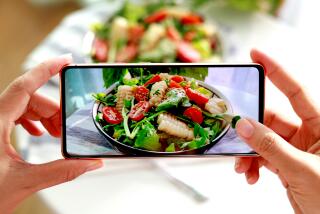Want to Eat Better? Listen to Your Body
- Share via
My kids love to go hiking with me. One reason, besides all the obvious pleasures to be found in the Santa Monica Mountains, is a game we play called “I Spy.” It begins when someone shouts, “I spy . . .” and fills in the blanks with a color--say, red. Everyone else then has to guess what that red thing is, and the winner gets to spy something else.
What’s great about “I Spy” is the way it trains the eye. Instead of focusing on just the gray rock, you learn to see its rust-colored veins. Instead of a flower’s blue petals, you also notice its yellow pistil.
And just as it is critical to develop this keener awareness in the visual world, so too must we develop it when it comes to our relationship with food.
Unfortunately, most people don’t connect eating with the way they feel physically and mentally, unless they’re coping with indigestion. While they wouldn’t dream of putting anything less than the highest octane gasoline into their car’s tank, they don’t seem to realize that their bodies also knock and ping from inferior fuel.
You just have to learn what to listen for because often what you think you’re hearing is something else entirely.
Recently, a friend complained to me about being overweight. Joanne was unable to control her eating, she said, especially in the evenings. “I’ve never had good willpower,” she moaned.
But the truth is that her eating and weight problems didn’t stem from a lack of willpower. In fact, she has pretty good willpower, especially earlier in the day. Typically, Joanne said, she would nibble a piece of toast for breakfast and have a small salad with vinaigrette dressing for lunch.
No wonder that, by 3 o’clock, even a super-leaded Starbucks latte couldn’t jump-start her--or prevent her from indulging her cravings, even bingeing. Her body was actually reacting as it should to the lack of calories she fed it during daylight hours. A body depleted of energy reserves will start a physiological chain reaction that ends in overeating and bingeing, behavior that can’t be controlled.
Joanne isn’t alone in misinterpreting her body’s signals. Most people, in fact, could stand to develop a keener body awareness. Doing so requires some practice and a certain amount of diligence.
My suggestion, because it’s always worked for me--and for Joanne--is to perform an experiment that nutritionist Bonnie Modugno often suggests to her clients. Divide a piece of paper into three columns. The left-hand column is for recording the foods you eat and the time of day you eat them. Most likely, you’ll be able to see a pattern. In Joanne’s case, the pattern was that she consumed most of her calories late in the day.
In the middle column, record how hungry you felt before eating. Rate your hunger on a scale of 1 to 5, 1 being not that hungry and 5 being ravenous. This column will give you some indication of whether you’re eating out of real hunger or for some other reasons--say, boredom, anxiety, loneliness, or some other emotional reason. Joanne, for example, could see that most of what she ate in the evenings had no connection to actual hunger.
The right-hand column is for recording how you feel after eating. Listen carefully to your body’s messages. Are you sluggish? Sleepy? Are you invigorated? Alert? Agile? Are you feeling down, or ready for action? It was in this column that Joanne saw a direct link between what she ate, when she ate and how much she ate with her mood and energy level.
Keep this diary / chart for a solid week. Then carefully study the results. If you’re like Joanne--indeed like most people--you’ll be surprised at how your eating habits have evolved into repetitious patterns that may not support your health or well-being. Seeing clearly what you’re eating, as well as when and why, may be all the impetus you need to change to more healthful patterns--as Joanne did.
Eating better is like playing “I Spy.” As you continue to develop a keener awareness, the game becomes ever more interesting. In the way that you soon spot small details in the natural world that used to be invisible, so too do you learn to appreciate your body’s natural wisdom. The trick is learning to listen properly.
Copyright 1998 by Kathy Smith
*
Kathy Smith’s fitness column appears weekly in Health. Reader questions are welcome and can be sent to Kathy Smith, Health, Los Angeles Times, Times Mirror Square, Los Angeles, CA 90053. If your question is selected, you will receive a free copy of her video “Functionally Fit Peak Fat Burning.” Please include your name, address and a daytime phone number with your question.


